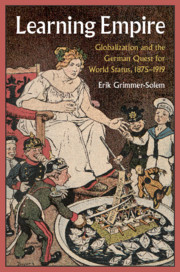Learning Empire Globalization and the German Quest for World Status, 1875–1919
Langue : Anglais
Auteur : Grimmer-Solem Erik

Looks at German global entanglements to recast how we interpret German imperialism, the origins of the First World War, and the rise of Nazism.
The First World War marked the end point of a process of German globalization that began in the 1870s, well before Germany acquired a colonial empire or extensive overseas commercial interests. Structured around the figures of five influential economists who shaped the German political landscape, Learning Empire explores how their overseas experiences shaped public perceptions of the world and Germany's place in it. These men helped define a German liberal imperialism that came to influence the 'world policy' (Weltpolitik) of Kaiser Wilhelm, Chancellor Bülow, and Admiral Tirpitz. They devised naval propaganda, reshaped Reichstag politics, were involved in colonial and financial reforms, and helped define the debate over war aims in the First World War. Looking closely at German worldwide entanglements, Learning Empire recasts how we interpret German imperialism, the origins of the First World War, and the rise of Nazism, inviting reflection on the challenges of globalization in the current century.
Introduction; Part I. Absent-Minded Empire, 1875–1897: 1. Frontier empire: the United States; 2. Island empire: Japan; 3. World economy: China and Venezuela; Part II. Empire Imagined, 1897–1907: 4. World policy; 5. The High Seas Fleet and power politics; 6. National efficiency and the new mercantilism; 7. Formal and informal empire; 8. Empire in crisis; Part III. Empire Lost, 1908–1919: 9. Colonial dreams; 10. World policy contained; 11. From world policy to world war; 12. War aims, peace resolutions, and defeat; Epilogue.
Erik Grimmer-Solem is Professor in the Departments of History and German Studies at Wesleyan University, Connecticut. He is the author of numerous works including The Rise of Historical Economics and Social Reform in Germany (2003). He was a University of Chicago Harper Fellow and has received awards from the Fritz Thyssen Foundation and the Leverhulme Trust, as well as two distinguished teaching prizes from Wesleyan University, Connecticut. His research on the Wehrmacht's involvement in the Holocaust was discussed in the newsweekly Der Spiegel, and debated in German parliament in 2014.
Date de parution : 12-2021
Ouvrage de 668 p.
15.2x22.9 cm
Disponible chez l'éditeur (délai d'approvisionnement : 14 jours).
Prix indicatif 39,35 €
Ajouter au panierDate de parution : 09-2019
Ouvrage de 668 p.
16.2x23.5 cm
Disponible chez l'éditeur (délai d'approvisionnement : 14 jours).
Prix indicatif 50,94 €
Ajouter au panierThème de Learning Empire :
© 2024 LAVOISIER S.A.S.



